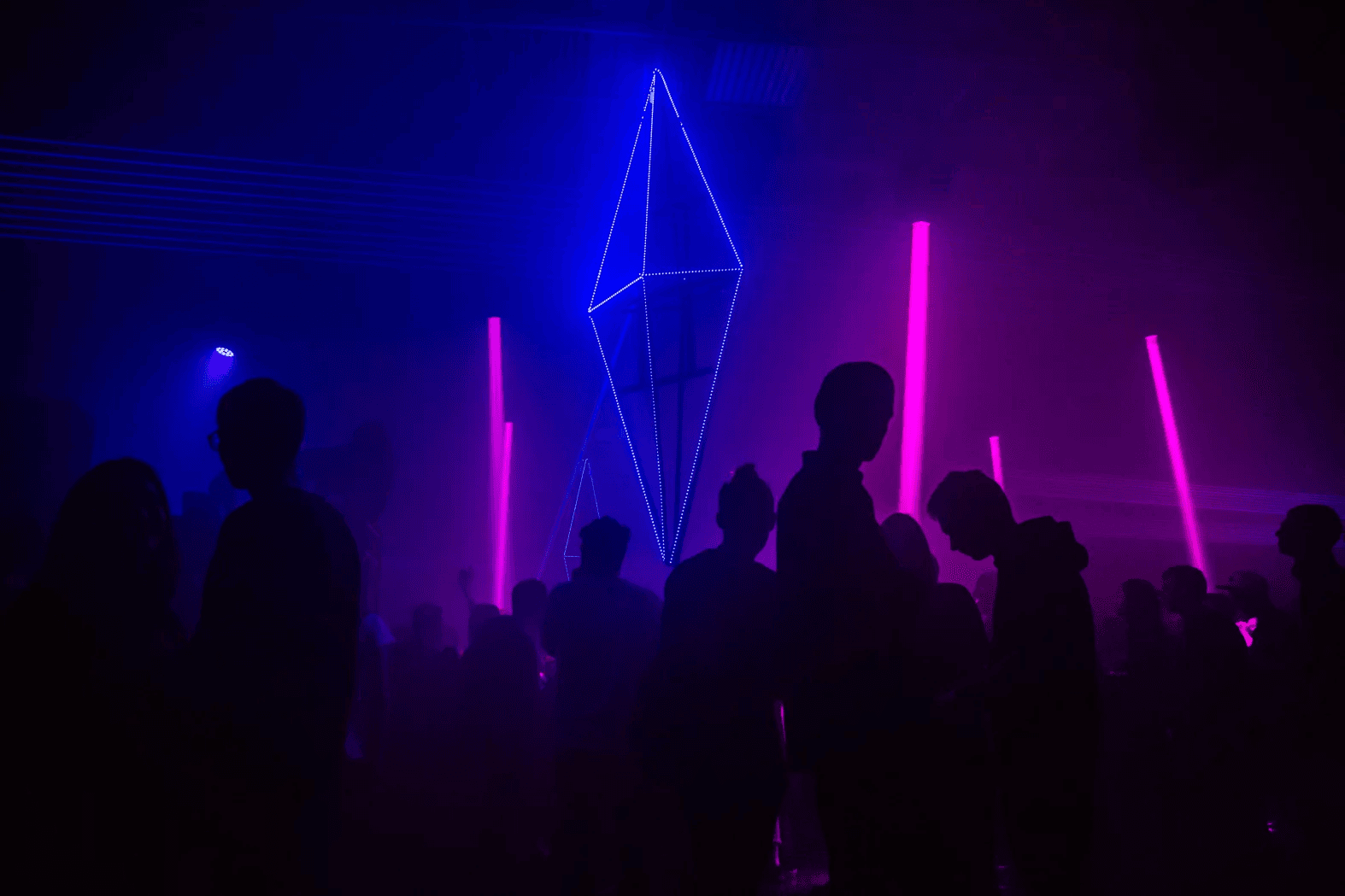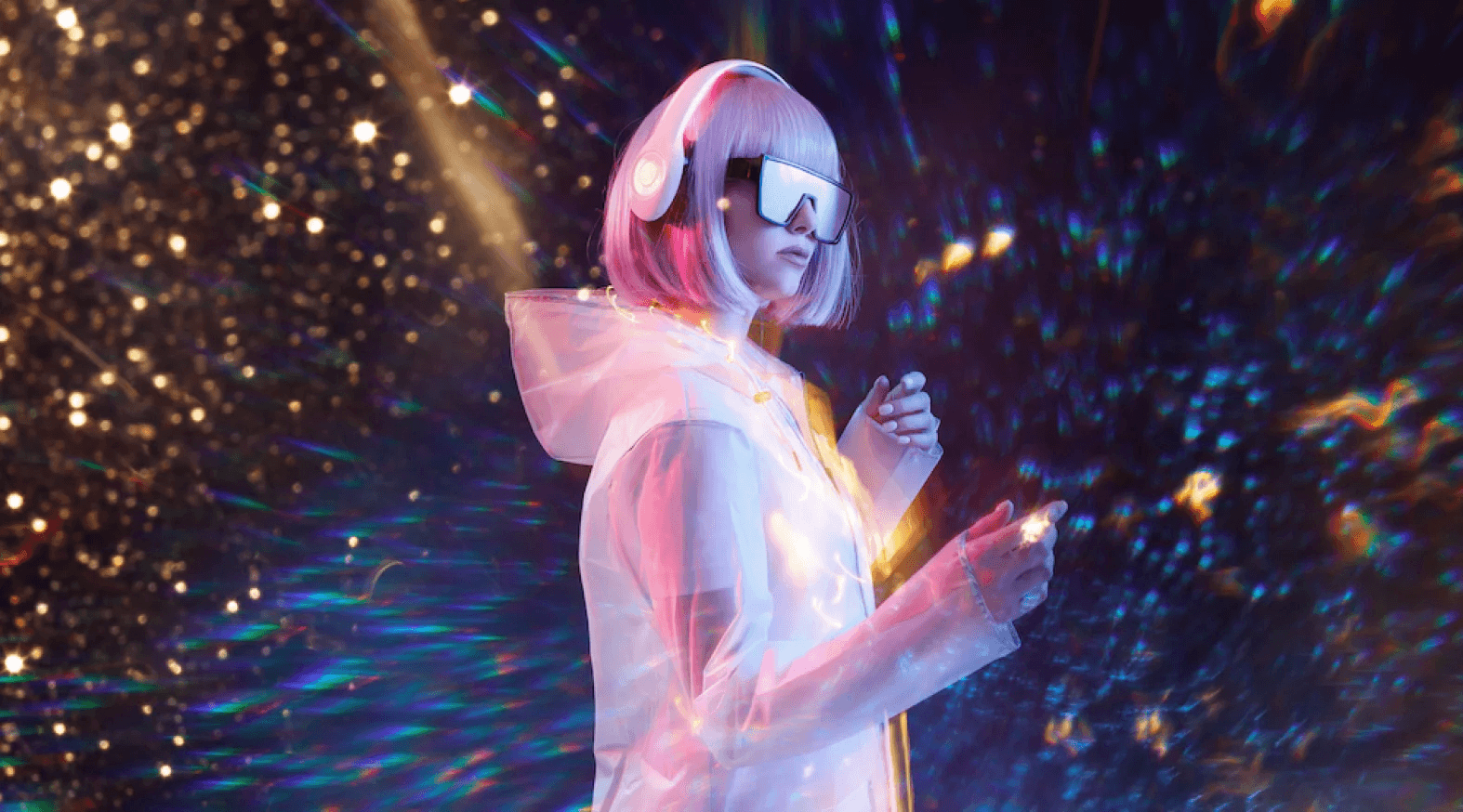العودة إلى المدونة
The power of virtual concerts
13/06/2023
Martin Petkov
As virtual spaces become commonplace, they open doors for the music industry to transform how artist host live performances and concerts. A survey by Ipsos revealed that 46% of GenZ and Millennials were as excited to attend a concert in virtual reality or the metaverse as they were to attend a physical event. This audience interest allows celebrities, artists, and music producers to create more immersive and engaging virtual music experiences that reach a wider pool of fans. Virtual concerts are accessible, convenient, and near-to-real experiences. Some successful virtual concerts have been pioneered by music icons like ABBA, Blackpink, and Megan Thee Stallion, paving the way for more artists to follow their lead.
How VR is changing the music industry
Virtual reality (VR) has significantly impacted the music industry, allowing artists and producers to create immersive, engaging, and interactive concerts and music videos that audiences can access globally.
Artists like Ariana Grande and Travis Scott have launched successful virtual concerts on Fortnite that attracted a global audience of over 78 million and 12 million respectively, allowing them to fully immerse attendees into a front-row experience from the comfort of their homes. Virtual concerts also give audiences a more personal and intimate experience, allowing fans to view the concert not merely as a member of the audience but go backstage, visit the sound booth, or even experience the event from the stage. For instance, applications like MelodyVR offer a variety of music shows that can be experienced in novel ways using the Oculus VR headset.
VR can also open up opportunities for artists to experiment with sound by having the chance to record synthesized versions of instruments that wouldn’t be possible in other scenarios. Some applications allow musicians to play instruments while receiving tactile feedback in real-time; for instance, while an artist plays the guitar, they can feel the string's vibrations. VR technologies will present more innovative applications in the music industry as they advance and become more high-tech.

Pros and cons of virtual concerts
Pros of virtual concerts:
Accessibility: A virtual concert can connect people worldwide who cannot attend a show physically, giving them a near-to-real experience. Virtual performances also allow individuals with disabilities equal access to music events by providing real-time captions and making up for the lack of disability-friendly physical venues.
Second only to reality: VR can transport you to the venue rather than watching a concert on a 2D screen, allowing audiences to look around and explore the space while getting a front-row view. A live show can use 360-degree sensors and cameras to help virtual audiences visualize the event from every angle.
Convenience: Virtual concerts can be convenient for audiences who can avoid travel, crowds, and long lines to experience a music show and watch the event from their homes.
Cons of virtual concerts:
Lack of energy and excitement: Unlike real-world music concerts, virtual experience attendees don’t have the same energy that audiences resonate in physical events by singing along and enjoying the experience together. This low-energy environment can reduce the experience value for attendees and musicians, making it isolating or impersonal.
Technical obstacles: Virtual concerts often require access to VR technologies, which have yet to achieve mainstream user adoption. VR headsets are expensive for the masses and can be cumbersome or too technical for audiences.
High-cost tickets: Often, virtual concerts cost the same or more than physical concert tickets despite the lack of production and venue costs. For instance, the Polo G and Chief Keef virtual concerts were priced similarly to physical shows, which could make them less appealing to the regular consumer.

Best virtual concert platforms
StageIt: This virtual concert platform allows artists to perform online from any venue while also providing elements of interactivity and tools for monetization. The platform enables artists to set their performance dates, create customizable ticket prices, and set the length of their concerts. Fans can interact with artists through chats and requests for songs. The platform allows audiences to access performances from over 700 artists a week, including Rhett Miller, Waxahatchee, and Janet Devlin.
Veeps: A ticketed streaming service that provides audiences with various live concerts, music performances, and events. Veeps allow artists to generate revenue and connect with a larger fanbase with easy accessibility through their application, downloadable on Apple TV, Roku, iOS, and Android. The platforms also offer real-time chats during live performances. Renowned artists like Bob Dylan, Brandi Carlile, and Liam Payne have used Veeps to live-stream performances.
Twitch: A platform primarily popular among gamers, Twitch is also great for artists to stream music. The platform has a growing community of DJs, singers, and music producers who use it to connect with their fans and monetize their music. The platform also allows for artist and fan interactions through exchanging ideas, song requests, and Q&As.
Zoom: Established as a video communications company, Zoom is not often considered an option to host music performances. However, the company released OnZoom in 2020, a marketplace for immersive experiences catered to businesses and entrepreneurs to host ticketed events that are discoverable on the platform. OnZoom can be an attractive option for musicians looking to set up intimate and engaging events.
Bandcamp: This music distribution platform recently announced its capability to host virtual concerts through live streaming. The platform is excellent for independent artists to build a community and generate income through ticketing events, selling merchandise and music through the merch table, and options to earn virtual gifts.

Best virtual concerts to date
ABBA Voyage
ABBA launched its virtual concert ‘ABBA Voyage,’ where the group's members were represented as 3D characters or ‘Abba-tars’ to perform a 90-minute set of their most popular titles. The virtual performance mimicked the group’s realistic dance moves and facial expressions using motion-capture cameras during a 5-week session before the final event. The immersive music experience presented ABBA on a 65 million pixel screen for audiences to view, along with lighting effects and projections that created a life-like experience. The event sold 1 million tickets, as reported in 2023 by Variety.
Blackpink virtual concert
The leading K-pop band, Blackpink, ventured into the virtual space to host a concert on the gaming platform PUBG Mobile. The concert represented group members as avatars who performed the band’s hits and debuted their latest track, ‘Ready For Love.’ Players could also support the band by purchasing customized outfits worn by the group on the final performance. As a part of the concert, fans could buy the ‘Blackpink Voice Pack’ featuring voice commands from all Blackpink members, available for use in-game. Digital Music News reported that the event attracted an audience of 15.7 million, highlighting the event's ability to connect fans globally on a single platform.
Stranger Things virtual concert
Ahead of the Netflix show Stranger Things season premiere, the platform partnered with Doritos to create a virtual concert, ‘Live From The Upside Down.’ The event showcased music icons like Soft Cell, The Go-Go’s, and Charli XCX. Audiences could access the event by registering online or buying specially marked Doritos bags or their new 3D Crunch Three Cheese flavor. Fans could purchase Stranger Things merchandise from the official Frito-Lay website.
Megan Thee Stallion virtual concert
Megan Thee Stallion joined forces with AmazeVR to create her first virtual concert, ‘Enter Thee Hottieverse.’ The music event allowed audiences to enjoy the experience from their nearest movie theatre during any of the 100 screenings, where viewers used VR headsets to watch the show. The concert aimed to make the virtual immersion more accessible to audiences as not everyone owns a VR headset, and not all fans can be physically present at a live show. The experience had realistic graphics generated by recording the concert using 9K cameras and developing a virtual environment using virtual effects produced by Unreal Engine - which made the audience feel they were present for the show in real life.
Billie Eilish virtual concert
The ‘Where Do We Go? The Livestream’ was Billie Eilish’s foray onto the virtual stage with an immersive concert experience enhanced by extended reality (XR). The event used striking imagery and animated graphics and was available for audiences to watch for $30. The strategic camera angles used to capture the performers, Bille Eilish, Finneas, and Andrew Marshal - the drummer, made audiences feel they were in the performance themselves. The event also allowed for interactions with fans through a live chatroom. Audiences could even browse merchandise and music albums in a 360-degree room.
Virtual concerts in 2023
Advancements in technology: Virtual concerts will evolve to provide more immersive and interactive experiences enhanced by better VR technology and 360-degree cameras. Some live event companies leading the space to offer unique virtual environments and visuals through innovative technology are Industrial Light & Magic (ILM), Superfly, and AmazeVR.
Artificial intelligence (AI) in virtual concerts: As AI technologies advance, virtual concerts can offer audiences more personalized experiences through real-time adaptation to individual preferences. An individual’s music taste, mood, and interactions can help determine what part of a virtual music experience they will enjoy. Virtual AI assistants can also improve the audience experience by creating a personalized schedule of performances to attend in a larger-scale virtual music festival.
Greater integration with gaming: Virtual music performances are witnessing greater integration with other forms of entertainment, like gaming platforms, to provide immersive and engaging experiences. Platforms like Roblox and Fortnite are becoming hotspots to connect with audiences and share music on a larger scale. For example, audiences attended Lil Nas X’s concert on Roblox 33 million times.
Conclusion
Virtual concerts are revolutionizing the music industry by allowing artists to connect with audiences in novel, engaging, and interactive ways. Prominent success stories of virtual concerts hosted using VR technologies, enhanced graphics, and 360-degree cameras include ABBA’s life-like virtual concert, ‘ABBA Voyage’ and Billie Eilish’s high-quality visual effects concert, ‘Where Do We Go? The Livestream’. Though considered highly immersive, virtual performances can lack energy and be expensive for audiences to attend. However, technological advancements, enhanced AI capabilities, and integration with gaming platforms will allow virtual music experiences to evolve, becoming more advanced and personalized.
Are you an artist, band, or music producer looking to launch an immersive virtual concert for fans globally? We can help you engage with your music community by developing, scaling, and monetizing your experience in the metaverse. Get in touch with us!
13/06/2023
Martin Petkov
اشترك في النشرة الإخبارية الشهرية لدينا
حول LandVault
لاند فولت هي أكبر منشئ في الميتافيرس مع أكثر من 100 مليون قدم مربع من العقارات الافتراضية، وأكثر من 120 مبدعًا بدوام كامل، وقرابة 300 مشروع منجز. لقد ساعدنا العلامات التجارية على البناء والنمو في بيئات الألعاب منذ عام 2017 وفي الميتافيرس منذ عام 2021.
